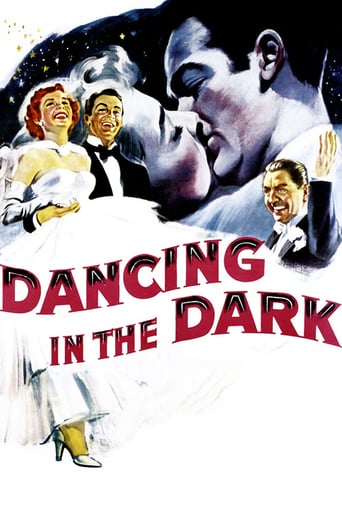blanche-2
Betsy Drake must have been "Dancing in the Dark" in this 1949 film starring William Powell, Mark Stevens, Adolph Menjou and Gene Hersholt. Black and white with not much budget, 20th Century Fox apparently used this movie musical to promote "The Prince of Foxes" (which they also didn't bother to shoot in color) rather than Betsy Drake. Nobody was doing her any favors by putting her in this film.William Powell plays a much hated has-been movie star named Emery Slade. Down on his luck and too proud to accept charity, he convinces Melville Crossman, the head of 20th Century Fox, that he can sign a Broadway star to a contract for a big film (not this one). The star is the daughter of his former show business partner. Fox puts him on as an agent and sends him to New York with a publicist, Bill Davis (Mark Stevens). Bill is in love with an aspiring performer, Julie Clarke (Drake). But she won't marry him until she's had her chance. Unbeknownst to Bill, Julie goes to see Slade to try and get an audition for the movie, not realizing that an item about it in the trade papers isn't really true. Drunk and half asleep, when Emery wakes up and sees Julie, he thinks she's an old girlfriend. There's a good reason for that. Maybe you can guess what it is. He did. Anyway, Emery discourages the Broadway star from taking the role and works with Julie so that Crossman will cast her.There are a couple of problems with this film. The first one is that it looks cheap. The second one is Betsy Drake. A pretty woman, Drake was only a fair actress, a non-dancer and a non-singer. So what is she doing in a musical playing an aspiring musical performer? Good question.William Powell is wasted here, as is Mark Stevens.At the end of the movie, there is a big premiere for "The Prince of Foxes." Crossman's office was apparently a replica of Zanuck's office, and name Melville Crossman was apparently a pseudonym that Darryl F. Zanuck used when he wrote scripts. I hope he didn't write this one.
edwagreen
I'm really in the dark about this picture.William Powell must have been in his dotage to have accepted the role of the conceited has-been actor in this disappointing 1949 film. After a terrific success three years before with Lucille Ball and Clifton Webb in "The Dark Corner," why did Mark Stevens get the part of the Hollywood hot-shot who really was that at all? As for Betsy Drake, this girl is plain awful in her singing and dancing routine. That's the ending number of this abysmal movie.There were certain things that were rushed here such as her screen test and when they're trying to convey that her father in the movie is Powell. Did he really realize that Drake was his daughter during their first encounter?
cnb
This is the sort of movie that makes me think, "Please don't let some new viewer of musicals think that this is what great musicals are like." William Powell and Betsy Drake are horribly miscast, and the wonderful Dietz-Schwartz songs that shine four years later in "The Band Wagon" are staged here in unappealing, off-kilter ways. For example, the final number tries to jazz up the sexy ballad "Dancing in the Dark," renders it in a completely unromantic manner with some very odd dancing, and inserts a ridiculous Dutch couple skit in the middle of it in order to include the song "I Love Louisa" (which was conceived as a German-style song).IMDb says the film was originally in color, but the print I saw looked for all the world like something that had been colorized! I am not dismissive of all Fox musicals, but thank heaven MGM got hold of the title and the songs and made a much better movie with them.
marcslope
William Powell became exceedingly picky about roles late in his career, so it's a mystery why he chose this one. The guise of a conceited, self-centered has-been movie star gives him no chance to show off his finely honed light comedy style, and his character's conversion to a good sport taxes the talents of even this actor. One of several Hollywood-looks-at-Hollywood mid-budget musicals of the year, it's hampered by 20th Century Fox's relentless self-promotion and too few musical numbers. Even the ones that are there are exceedingly modest, perhaps because Betsy Drake is obviously dubbed and no great shakes as a dancer, either. The feeble screenplay presents her as the answer to the Hollywood musical's prayers, but she comes across as a nice kid who probably shouldn't be in movies. A great Schwartz-Dietz stage score gets trammeled; most of these songs were presented to far better effect a few years hence, in MGM's "The Band Wagon."


